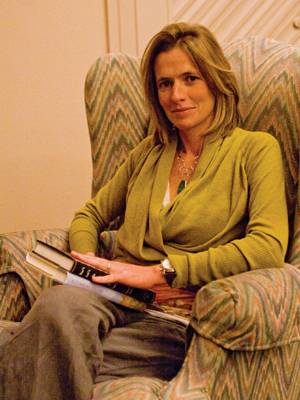Author discusses her sense of duty as a writer

Alexandra Fuller, author of Don’t Let’s Go to the Dogs Tonight: An African Childhood and Scribbling the Cat: Travels with and African Soldier, held a lecture Thursday night in the Great Hall of the Memorial Union. Photo: Will Johnson/Iowa State Daily
November 6, 2008
Alexandra Fuller’s duty is to tell the truth.
Fuller, author of “Don’t Let’s Go to the Dogs Tonight: An African Childhood” and “Scribbling the Cat: Travels with an African Soldier,” spoke Thursday night in the Durham Great Hall of the Memorial Union about growing up in Rhodesia during the war, and her duty to tell the truth as a writer.
“An African Childhood” tells about Fuller’s life as a child, and her deeply racist family during the Rhodesian war.
“The incredibly difficult decision for me is ‘Do I put this in black and white for all time and make it the truth, or do I live with it deep in my soul and pretend it never happened?’” Fuller said. “Finally, the most honest thing I could do, the most healing thing I could do, the most tender and loving thing I could do, was to write the truth.”
Fuller said “An African Childhood” was not the book she intended to write. She said she wrote many drafts of the book that “glossed over the racism and shoved the drinking under the carpet.”
“The book you end up writing is not the book you intended to write to begin with,” Fuller said. “The problem was that I was skirting around the truth, and so there was this dreadful black hole of absence in my book.”
Fuller said her mother was so furious at how Fuller portrayed her in the book that she began drinking. Her mother had organized a party in celebration of the book before she read it, and by the time she knew what the book was about it was too late to call the party off.
“She was in the kitchen screaming at Kelvin, who’s the cook, every racial slur you could think of,” Fuller said. “She’s yelling at him; I walk into the kitchen and she turns to me and she goes ‘You! You made me look like a racist alcoholic!’”
Fuller gave an anecdote to illustrate her duty as a writer.
“Three people find themselves in a locked cell. One person is awake, two people are asleep and the person who is awake realizes that the air is running out in the room. So she has two choices: Does she wake up the sleeping people or does she let them sleep? Of course the kind thing to do is to let them sleep, but really the honest thing to do is to wake them up,” Fuller said.
“The real miracle of that is not that you wake people up to your horror — here is racism, here is war, here is a planet in peril — the real miracle is that you will wake the right person up and they will know how to open that door.”
Fuller said her duty, as a writer, is to find her voice and tell the truth.
“You have one shot at this life, from beginning to end; it’s going to be far faster than you think,” Fuller said. “Your only job is to find your voice.”
















